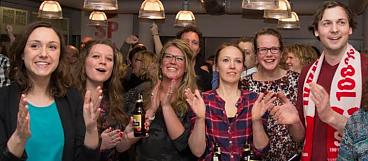Netherlands

The resistible rise of the far right in Europe

Far-right electoral victory in the Netherlands
Netherlands: Deckchairs quietly shuffled in EU poll fizzer

Socialist Party protests against European free trade treaty.
Holandés: Una resaca en lugar de un terremoto

Emile Roemer.
Netherlands elections: A hangover instead of an earthquake

Dutch Socialist party leader Emile Roemer.

Emile Roemer.
[English at http://links.org.au/node/3010.]
Por Will Wroth, traducción para www.sinpermiso.info por Gustavo Buster
Septiembre 9, 2012 -- www.sinpermiso.info -- Aunque las elecciones legislativas se suelen considerar con demasiada frecuencia como "históricas" y sus resultados, celebrados como "avalanchas decisivas" o "terremotos políticos", cuando el polvo de la batalla se disipa, en la mayoría de los casos no es para tanto. Pero las elecciones legislativas en los Países Bajos el próximo 12 de septiembre parecen despertar todo tipo de expectativas.
La caída imprevista del anterior gobierno minoritario, el más derechista del que se tenga memoria y rehén del apoyo del Partido de la Libertad (PVV) del demagogo xenófobo Geert Wilders, ha provocado la convocatoria de unas elecciones que pueden producir un cambio inédito en el espacio político de la izquierda y unos resultados que planteen algunos problemas estratégicos fundamentales a los socialistas tanto en los Países Bajos como en el resto del mundo, al mismo tiempo que enfrentaran a la oligarquía económica y política del país a una realidad cuanto menos molesta.

Cartoon of Socialist Party leader Emile Roemer that appeared in Quote, a Dutch business magazine. Caption reads: "If Roemer becomes prime minister, we’ll all move to Switzerland.”
September 1, 2012 – Links International Journal of Socialist Renewal -- Although parliamentary elections are often billed as “historic”, and results hailed as “landslides” and “political earthquakes”, it usually turns out not to have been quite that dramatic when the dust settles. But the September 12 national elections in the Netherlands really do seem to be living up to expectations of that magnitude.
The unexpectedly early fall of the previous minority cabinet—the most right wing in living memory, and hostage to the support of xenophobic demagogue Geert Wilders and his Party for Freedom (PVV)—has triggered an election that seems likely to usher in a radical realignment of the landscape on the left, and could realistically produce an outcome that poses some fundamental strategic questions for socialists in the Netherlands and beyond, while presenting an uncomfortable reality check for the country’s economic and political establishment.
Netherlands: Today Islamophobia is the main form taken by racism



